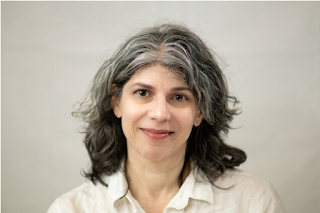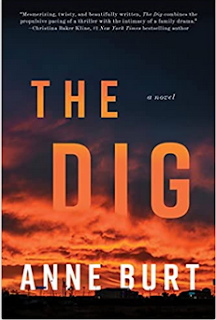Anne Burt is the author of the new novel The Dig. Her other books include My Father Married Your Mother. She lives in New York City.
Q: What inspired you to write The Dig, and how did you create your character Antonia?
A: The genesis of The Dig comes from the ancient Greek drama Antigone: the story of a young woman forced to choose between the laws of the state and her own moral and ethical imperatives.
Antigone’s brothers have killed each other in the battle for control of the ancient Greek city of Thebes; her uncle, who has become Thebes’ ruler, decrees that the brother who fought on his side shall receive a proper burial and the brother who fought for the rebels shall remain unburied. Antigone defies her uncle and buries her brother.
I’ve thought about the moral quandaries that animate the character of Antigone for a long time and have wanted to explore them in contemporary fiction.
I flipped the script for this modern retelling, featuring a young lawyer named Antonia King, set in Minnesota. Instead of burying her brother, Toni wants to excavate the truth about her brother’s disappearance and the lies they’ve been told about their Bosnian-born past.
Toni unearths tragic family secrets that resonate with the conflicts in the classic play and also resonate with current American conflicts around loyalty, love, and the wages of war.
Q: The author Angie Kim said of the book, “The Dig is a riveting and chilling tale that mixes family drama and corporate intrigue (à la Succession) with thought-provoking insights about immigration, adoption, and the horrors of war. I couldn’t put it down.” What do you think of that description?
A: I’m obsessed with the brilliant writing on Succession – and I’m a huge fan of Angie Kim’s work – so I love it! I can see the parallels to Succession, although The Dig takes places in a small northwestern Minnesota town called Thebes, not in New York City.
The Dig’s action hinges on intense clashes between family members over the role of their local business, King Family Construction. A community of Somali refugees faces xenophobia and racism from many of Thebes’ white townspeople, and Toni and her brother, Paul, survivors of the Bosnian genocide who were raised in Thebes since early childhood, are caught in the middle between the demands of their adoptive uncle’s business and the rights of the new Somali residents.
Q: Did you need to do any research to write the novel, and if so, did you learn anything that especially surprised you?
A: Much of Antonia’s backstory came from research I did as a consultant to the U.S. Holocaust Memorial Museum in Washington, D.C., between 2018-2021. When I was writing The Dig, I immersed myself in written accounts of the Siege of Sarajevo in 1993.
Antonia’s past really came to life when a friend introduced me to a young Bosnian-born woman who has been living in the U.S. since she was Antonia’s age; she generously shared what she remembers of the sights, sounds, and smells of her birthplace and helped me tremendously as I tried to bring verisimilitude to Antonia’s fragmented memories in the novel.
My passion to address the Bosnian genocide in the context of a novel dates all the way back to 1987, when I traveled to Sarajevo – it was the first time I’d left the United States - as a 19-year-old. This was before the Balkan Wars when Bosnia and Herzegovina were part of the former Yugoslavia.
The city of Sarajevo I encountered then was filled with synagogues, mosques, and churches, all in seeming harmony through the naive outsider eyes of an American college student. And as a Jewish American, I saw a vision of a world where interfaith harmony was possible.
Only three years later, the violence and enmity that had been seething for centuries emerged again.
Now, in my 50s, I’m far less naïve than I was at 19. However, trying to connect across difference through stories that touch on deep and universal human emotions continues to feel like a goal to strive for, both in fiction and in life.
Q: Did you know how the novel would end before you started writing it, or did you make many changes along the way?
A: I had an image of the scene that closes The Dig in mind from the start, but it took many drafts to figure out how to get there! No spoilers, because The Dig is a mystery, but I will say that one key character died until the very last draft before publication. Happily for them, I pivoted, and they made the final cut.
Q: What are you working on now?
A: Two very different books: a literary novel also influenced by stories from ancient Greece, and a psychological thriller set in the Adirondack Mountain region of Upstate New York. Toggling between the two genres stretches my imagination and keeps me fresh.
Q: Anything else we should know?
A: How grateful I am to independent bookstores across the country! Indie booksellers are the reason The Dig is reaching its audience – their excitement about getting the novel into the hands of readers has been magnificent.
Finding out that The Dig would be on the Indie Next List of top picks for March 2023 was the greatest pre-publication moment – and hopefully can serve as an inspiration for other over-50 writers and artists to keep working and keep pushing forward. Publishing a debut novel at 55 is a sweet victory over my own fears that I’d never see it happen. But it did!
--Interview with Deborah Kalb


No comments:
Post a Comment